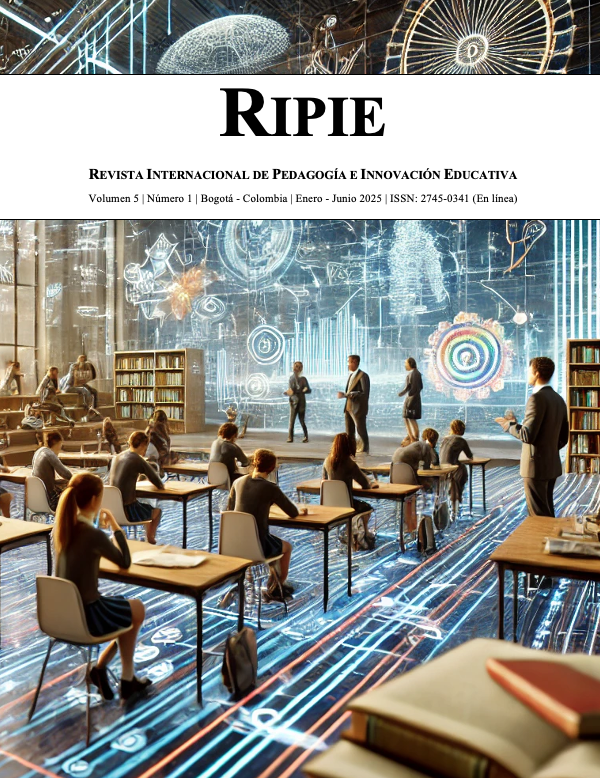The Impact of ChatGPT on Learning Financial Mathematics in University Business Administration Students (ADE).
DOI:
https://doi.org/10.51660/ripie51232Keywords:
ChatGPT, artificial intelligence, financial mathematics, higher education, cognitive autonomyAbstract
This study examined the impact of ChatGPT on learning financial mathematics among students in the Business Administration degree (ADE). A qualitative methodology was used through a descriptive case study involving five student groups. The objective was to assess how artificial intelligence can enhance accuracy in financial calculations and structuring responses. Results showed improved calculation accuracy and organization of problem-solving processes, with immediate feedback. However, some students became dependent on the tool, reducing their problem-solving autonomy. The study highlighted the need to balance AI use with fostering critical thinking and cognitive autonomy. Limitations included insufficient attention to technology access disparities. It concluded that while ChatGPT holds great potential to support learning, its integration must be carefully managed to prevent students from losing critical skills.
Downloads
References
Acevedo, E. N. (2023). La inteligencia artificial en la educación: Una herramienta valiosa para los tutores virtuales universitarios y profesores universitarios. Panorama, 17(32), 1-9. https://doi.org/10.15765/pnrm.v17i32.3681
Akiba, D., & Fraboni, M. C. (2023). AI-supported academic advising: Exploring ChatGPT’s current state and future potential toward student empowerment. Education Sciences, 13(9), 885. https://doi.org/10.3390/educsci13090885
Aler, T. A., Mora-Cantallops, M., & Nieves, J. C. (2024). How to teach responsible AI in higher education: Challenges and opportunities. Ethics and Information Technology, 26, 3. https://doi.org/10.1007/s10676-023-09733-7
Archila, P. A. (2015). Uso de conectores y vocabulario espontáneo en la argumentación escrita: Aportes a la alfabetización científica. Revista Eureka sobre Enseñanza y Divulgación de las Ciencias, 12(3), 402-418.
Bañales, F. G., Vega, L. N. A., Araujo, A. N., Reyna, V. A., & Rodríguez, Z. B. S. (2015). La enseñanza de la argumentación escrita en la universidad: Una experiencia de intervención con estudiantes de lingüística aplicada. Revista Mexicana de Investigación Educativa, 20(66), 879-910.
Barrios-Tao, H., Díaz, V., & Guerra, Y. M. (2021). Propósitos de la educación frente a desarrollos de inteligencia artificial. Cadernos de Pesquisa, 51, artículo e07767. https://doi.org/10.1590/198053147767
Calle, K. M. Z., & Mediavilla, C. M. Á. (2021). Tecnologías emergentes aplicadas a la práctica educativa en pandemia COVID-19. Revista Arbitrada Interdisciplinaria Koinonía, 6(3), 32-59. https://doi.org/10.35381/r.k.v6i3.1303
Chicaíza, R. M., Castillo, L. A. C., Ghose, G., Magayanes, I. E. C., & Fonseca, V. T. G. (2023). Aplicaciones de ChatGPT como inteligencia artificial para el aprendizaje de idioma inglés: Avances, desafíos y perspectivas futuras. LATAM Revista Latinoamericana de Ciencias Sociales y Humanidades, 4(2), 2610-2628. https://doi.org/10.56712/latam.v4i2.781
Cisneros-Barahona, A. S., Marqués Molías, L., Samaniego Erazo, N., & Mejía Granizo, C. M. (2023). La competencia digital docente. Diseño y validación de una propuesta formativa. Pixel-Bit Revista de Medios y Educación, 68, 7-41. https://doi.org/10.12795/pixelbit.100524
Degli-Esposti, S. (2021). El rol del análisis de género en la reducción de los sesgos algorítmicos. ICE, Revista de Economía, 921. https://doi.org/10.32796/ice.2021.921.7265
Gerring, J. (2017). Qualitative methods. Annual Review of Political Science, 20, 15-36. http://dx.doi.org/10.1146/annurev-polisci-092415-024158
Gómez, W. O. A. (2023). La inteligencia artificial y su incidencia en la educación: Transformando el aprendizaje para el siglo XXI. Revista Internacional de Pedagogía e Innovación Educativa, 3(2), 217-229. https://doi.org/10.51660/ripie.v3i2.133
González, V. M., & Romero, R. R. (2022). Inteligencia artificial en educación: De usuarios pasivos a creadores críticos. Figuras, Revista Académica de Investigación, 4(1), 48-58. https://doi.org/10.22201/fesa.26832917e.2022.4.1.243
Guzmán-Simón, F., & García-Jiménez, E. (2015). La evaluación de la alfabetización académica. RELIEVE, 21(1). https://doi.org/10.7203/relieve.21.1.5147
Hwang, S. (2022). Examining the effects of artificial intelligence on elementary students’ mathematics achievement: A meta-analysis. Sustainability, 14, artículo 13185. https://doi.org/10.3390/su142013185
Leão, H. M. C., Gallo, J. H. da S., & Nunes, R. (2022). La bioética se enfrenta hoy a enormes desafíos. Revista Bioética, 30(4). https://doi.org/10.1590/1983-80422022304000es
Malinka, K., Peresíni, M., Firc, A., Hujnák, O., & Janus, F. (2023). On the educational impact of ChatGPT: Is artificial intelligence ready to obtain a university degree? Proceedings of the 2023 Conference on Innovation and Technology in Computer Science Education, 1, 47-53. https://doi.org/10.1145/3587102.3588827
Martínez-Comesaña, M., Rigueira-Díaz, X., Larrañaga-Janeiro, A., Martínez-Torres, J., Ocarranza-Prado, I., & Kreibel, D. (2023). Impacto de la inteligencia artificial en los métodos de evaluación en la educación primaria y secundaria: Revisión sistemática de la literatura. Revista de Psicodidáctica, 28, 93-103. https://doi.org/10.1016/j.psicoe.2023.06.002
Molina, M. E., & Carlino, P. (2013). Escribir y argumentar para aprender: Las potencialidades epistémicas de las prácticas de argumentación escrita. Texturas, 13(1), 16-32.
Pacheco-Mendoza, S., Guevara, C., Mayorga, A., & Fernández, J. (2023). Artificial intelligence in higher education: A predictive model for academic performance. Education Sciences, 13, artículo 9990. https://doi.org/10.3390/educsci13100990
Prieto-Andreu, J. M., & Labisa-Palmeira, A. (2024). Quick review of pedagogical experiences using GPT-3 in education. Journal of Technology and Science Education, 14(2), 633-647.
Ramos, J. R. G. (2018). Cómo se construye el marco teórico de la investigación. Cadernos de Pesquisa, 48, 830-854. https://doi.org/10.1590/198053145177
Zacharis, N. (2016). Predicting student academic performance in blended learning using artificial neural networks. International Journal of Artificial Intelligence & Applications, 7, 17-29. https://doi.org/10.5121/IJAIA.2016.7502
Downloads
Published
Issue
Section
License
Copyright (c) 2025 International Journal of Pedagogy and Educational Innovation

This work is licensed under a Creative Commons Attribution-NonCommercial-ShareAlike 4.0 International License.
Articles are published under the terms of a licence that permits use, distribution and reproduction in any medium, provided that the original work is properly cited. Ed&TIC retains the proprietary rights to the published works and actively promotes the reuse of these works under the terms of the aforementioned licence, which encourages the dissemination of knowledge and collaboration in the academic community.


